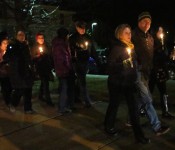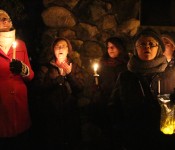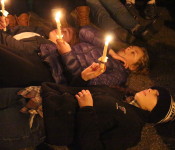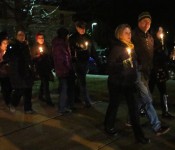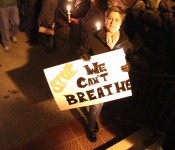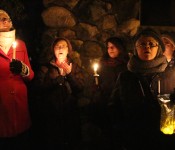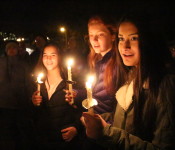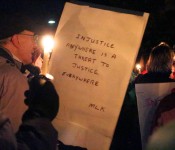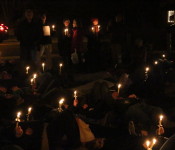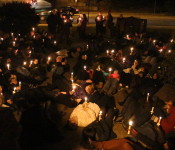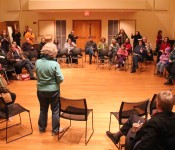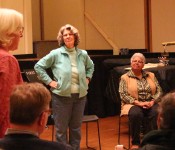- Marchers demonstrating in Belmont on Sunday, Dec. 14.
- Singing “We Shall Overcome” at the First Church in Belmont.
- Laying on the ground for four minutes in Belmont.
In the chill of a cold, Sunday darkness, a long line of people illuminated the night with candles as they weaved a chain of protest from Belmont Center, under the commuter rail bridge and towards the post office on Concord Avenue.
The marchers, numbering more than 200, were accompanied by a steady chant of concern.
“Hands up, don’t shoot!”
“Black lives matter!”
When the assembly reached the entry to The First Church in Belmont at the intersection of Concord and Common, the crowd began a call-and-response heard across the country for the past three weeks.
“What do we want?”
“Justice.”
“When do we want it?”
“NOW!”
For the participants – some who first marched in the 1960s Civil Rights demonstrations to a large number of teenagers and children who were participating in their first action – the events of the past four months involving the deaths by police of several black men and youths which many claim the judicial system appeared indifference to the action of law enforcement brought them out to voice their collective anger.
At the church, the group sang “We Shall Overcome,” before laying on the ground in silence for four minutes, one minute for every hour the body of Michael Smith – shot by a police officer in Ferguson, Mo. – laid on the street on a hot August afternoon.
For Molly Thayer and her friends from Belmont High School, participating in the march was a symbolic joining of hands from suburban Belmont to Ferguson and Staten Island, NY where Eric Garner died after a struggle during an arrest.
“Belmont is not a town that we have these sorts of incidents but there’s a need to express our support for people who are effected. We can not look away,” Thayer said.
That sentiment is what prompted Patricia Garcia, the chair of First Church’s Social Action chair, to call for a march in Belmont, “because it is a mostly-white community so we tend to see what occurred in Ferguson and elsewhere as being far away.”
“But what happened there and across the country happened to human beings, to African-American men. We all have a stake in learning what happened, why and do something about it,” said Garcia, a native from Mexico.
After spending an hour in active protest outside, most of the marchers entered the church’s sanctuary to talk, vent or discuss their and the country’s emotional state.
“I had to be here,” said one speaker while another said he “must act in some way” to the increase in incidents around the country.
“It’s been 26 years since Rodney King, and we’re back,” said Mike Collins from Belmont.
For Marian Evans Melnick, a First Church congregant and Watertown resident, cell phones and small video cameras in the hands of ordinary people have made possible “that immediacy where one person can make a difference” and allow everyone to bare witness to incidents.
Longer term, a way to alter the now injurious impact of the judicial system on many African Americans is to “dial back” the overtly punitive sentencing requirements for many non-violent offenders, according to State Sen Will Brownsberger, who is the co-chair of the Joint Judiciary Committee on Beacon Hill. Currently, a sentence for a non-violent drug crime has 700 “collateral” effects on a person including loss of licenses, denial of housing and long probation periods.
“It’s gone too far,” said Brownsberger.
From the protest was a sign of hope, said Collins.
“I am heartened by the fact that so many young people were here,” he noted.
“We need young people in New York and San Francisco but also here in Belmont” to come out for change.
